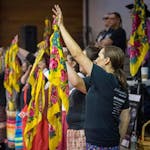Diahn Zeon was a standout long jumper at St. Paul's Concordia University, but he made the leap of his life when he switched careers and became a Minnesota State Trooper.
Zeon, 28, was unsatisfied in his role as a corrections officer at the Stillwater prison where he worked after college. He held a criminal justice degree but lacked the specific training necessary to land his dream job.
He got it by going through the patrol's Law Enforcement Training Opportunity (LETO), a 10-year-old program the patrol uses to diversify its force and recruit people who might not otherwise become troopers.
"I had always wanted to be in law enforcement, but didn't have the money or the skills," said Zeon, who went through LETO in 2016 and now is in his third year as a trooper.
From now through Feb. 15, the patrol is accepting applications from people like Zeon who are contemplating a career change. No law enforcement experience is necessary. All that's needed is a two- or four-year college degree in any discipline. The patrol will provide classroom training to prepare candidates to take the Peace Officer Standards and Training (POST) exam, which is required to become a licensed peace officer in Minnesota.
"LETO has assisted significantly with our efforts to have a diverse workforce," said Col. Matt Langer of the State Patrol. "Diversity in race, gender and experience is a foundation of LETO."
The State Patrol has seen fewer people applying for trooper jobs in recent years, Langer said. But this is hardly just a State Patrol problem. Agencies across the state — in general-purpose law enforcement as well — are looking to fill vacancies on their forces.
Last year, only 764 candidates — traditional candidates who have earned a two- or four-year law enforcement degree from an accredited postsecondary institution and those who have gone through programs such as LETO — took the POST exam. That's the fewest in the last 10 years. Of the 654 who passed the test, 596 were licensed as officers by the POST Board.
The decline is evident nationally, as well. Although the number of full-time sworn officers in general-purpose law enforcement nationwide rose by 8 percent from 1997 to 2016, that has not kept up with the growing U.S. population. The rate of officers per 1,000 citizens fell by 11 percent during that time frame, according to the Bureau of Labor Statistics.
Reasons for the drop are varied. A strong economy providing myriad employment opportunities, as well as negative publicity about police shootings and other high-profile cases over the past five years, both locally and nationally, are among factors that may be keeping qualified candidates away, said Deputy Bloomington Police Chief Mike Hartley.
Low pay might be a factor, too. Police officers and detectives nationally earn about $62,960. In Minnesota, the average yearly salary is $64,700 for police officers and sheriff's deputies, while detectives and front line supervisors make about $87,970, according to the Bureau of Labor Statistics.
"People are asking themselves, 'Is it worth it? And, is this what I want to get into?' " Hartley said.
To turn the tide, Bloomington joined several suburban departments two years ago to create the Pathways to Policing program to attract adults who may have considered a career in law enforcement but chose a different field. The program allows people with a two- or four-year college degree in any field to take a 22-week law enforcement training course that "is just as rigorous" as a college degree program, said Bloomington Police Chief Jeff Potts.
Upon completion of the 40-hour-a-week class, candidates take the POST exam just as traditional candidates do.
In December, the Minnesota Chiefs of Police Association took a page out of the U.S. Army's play book when it launched a "Wear the Badge" campaign to market careers in law enforcement to students. Videos featuring officers explaining why they got into policing and what they do on the job air during halftime of high school sporting events streamed online. The videos also are featured on the campaign's website, wearthebadge.org.
"In reality, kids play cops and robbers, so there is an interest when they are young, but then it seems to dissipate," said Potts, who also serves as vice president of the Chiefs Association. Noting that anybody can get into law enforcement, he said he hopes the campaign will resonate with students and capture an even broader audience.
"The Army has no problem with recruiting," Potts said. "They do a good job marketing what is appealing. We're doing that for law enforcement."
While standards to become a licensed officer have not relaxed, Potts said, it's no longer business as usual when it comes to finding candidates. Bloomington and seven other agencies participating in Pathways to Policing recently held a hiring event and had 400 applicants to choose from.
"We have to evolve with the times," Potts said. "The beauty of Pathways to Policing is … the likelihood of seeing a bigger applicant pool."
State Patrol candidates who pass the POST test move on to the police academy at Camp Ripley near Little Falls. There they join their counterparts who hold a traditional law enforcement degree for a grueling 17-week training to test their physical and mental ability to do the job. Upon successful completion, candidates are awarded a badge, uniform and personal squad car.
There are currently 18 LETO candidates going through training at Camp Ripley. Approximately 92 troopers have come through the LETO program in the past five years, according to the State Patrol. That includes former bus drivers, real estate agents, farmers and diesel mechanics. Even a former Blackhawk helicopter pilot, minor league baseball player and a man who worked as a chimney sweep are in the mix.
Lt. Gordon Shank, who also serves as the patrol's public information officer, was working at a senior assisted living home in Ohio when he heard about LETO and felt it was time to do something new. He's been with the patrol for eight years.
"You make a difference on the roads," said Shank, who patrols the roads during drunken driving, distracted driving and seat belt enforcement campaigns.
"You save lives. If you feel like you are stuck, this job has a purpose."
The patrol also hopes candidates like LETO will better reflect the makeup of the citizenry the patrol is charged to protect and serve. Zeon, a Richfield High School graduate, is a native of Liberia.
Zeon admitted that 26 weeks in the classroom, followed by intense training at the academy, was demanding. But the former long jumper — who through hard work etched his name into the record books at Concordia and qualified for the 2009 NCAA Division II indoor track and field championships — said it was all worth it.
On a recent Thursday, Zeon wrote a speeding ticket for a motorist going 83 mph in a 60 mph zone in Minneapolis. He also stopped a motorist in Richfield who made an illegal lane change. That motorist did not have a driver's license, nor was the vehicle insured.
On a different day, Zeon helped a stranded driver with a flat tire and encountered the same motorist three months later.
"I like to show that law enforcement is willing to help people," Zeon said. That's one of the best parts of the job, he said. "You get to meet people. You get to save lives.
"It's been a blast [being a trooper]," he said. "If you have any passion to do it, go for it."






